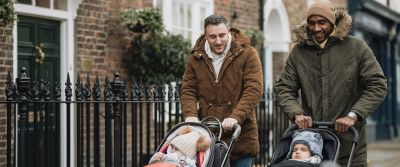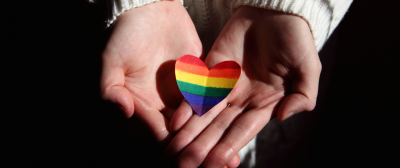LGBT+ History Month: 18 watershed moments on British TV and radio
February is LGBT+ History Month, and as the broadcasting regulator, we’re looking back at how the art of TV and radio has lent itself to stories, portrayals and activism of LGBTQ+ people in the UK, marking landmark moments over the last few decades.
How many of them do you remember?
1959
South, a TV play, was broadcast as part of ITV’s Play of the Week anthology series. South is said to be the earliest known gay-themed British television drama, and featured Peter Wyngarde in the lead role.
1982
One in Five, the UK’s first national TV show for and about lesbian and gay people, is shown on Channel 4. Set in London’s Heaven nightclub, the magazine-style show explored the problems facing queer people in Britain, and how to challenge them.
1988
Sir Ian McKellen comes out on BBC Radio in response to the government’s proposed Section 28 in Parliament.
1989
The first kiss between two gay men to be broadcast on British TV was shown in an episode of Eastenders, between characters Colin Russell (played by Michael Cashman) and his partner Barry Clark (Gary Hailes). This followed an earlier scene in 1987, in which Colin kissed Barry on the forehead – itself a landmark moment.
1994
The first pre-watershed kiss between two women on UK TV, on Channel 4’s Brookside, between characters Beth Jordache (played by Anna Friel) and Margaret Clemence (Nicola Stephenson).
This year also saw the first gay storyline in a children’s TV show. Byker Grove, BBC’s drama set in a north-east youth club, saw character Noddy (Brett Adams) develop feelings for his friend Gary (George Trotter) before kissing him on the cheek during a visit to the cinema.
1996
BBC Radio 4’s The Archers, the world’s longest-running soap, introduces its first openly gay character, Sean Myerson, played by Gareth Armstrong.
1998
ITV’s Coronation Street introduces Hayley Cropper, played by Julie Hesmondhalgh, the first trans character in a British soap. Hayley remained at home on the famous cobbles until her on-screen death in 2014.
1999
Groundbreaking TV drama Queer as Folk is first shown on Channel 4. The series, written by Russell T Davies, documented the lives of three gay men and was set in and around Manchester’s Gay Village.
2002
Brian Dowling becomes the first openly gay children’s TV presenter in the UK on ITV’s SMTV Live, after taking part in the second series of Big Brother.
2010
Gaydio became the UK's first dedicated LGBT FM radio service. It then went on to expand into digital radio when it acquired Gaydar Radio in 2013.
In the same year, Channel 4's Hollyoaks becomes the first British soap to feature a teenage trans storyline, following 15-year-old character Jason Costello.
2015
Boy Meets Girl, British TV’s first sitcom to feature a trans-theme, is first shown. Not only was this the first BBC comedy to focus on trans storylines, it was also the first to star a trans actor with Rebecca Root playing the character Judy.
2017
BBC launches Gay Britannia, a season of programming marking the 50th anniversary of The Sexual Offences Act 1967, which partially decriminalised male gay sex.
2020
Strictly Come Dancing features its first same-gender dance pairing, consisting of former Olympic boxer Nicola Adams and professional dancer Katya Jones. A year later, Great British Bake-Off winner John Whaite and professional dancer Johannes Radebe, both of whom are gay, became the show’s first all-male dance pairing – making it all the way to the final.
2021
It’s A Sin is broadcast on Channel 4. Another show from the pen of Russell T Davies; it depicts life during the AIDS crisis of the 1980s from a uniquely British viewpoint, featuring Years and Years’ Olly Alexander in the lead role of Richie Tozer.
2022
Heartstopper is shown on Netflix to wide acclaim. The series, written by Alice Oseman based on her original graphic novel, focuses on Charlie Spring, a gay schoolboy who falls in love with his classmate, Nick Nelson, and follows their developing relationship. The series won multiple awards and was praised for its depiction of young LGBT characters, and also included an early career role for Yasmin Finney, who will soon be seen in the new groundbreaking series of Dr Who alongside Ncuti Gatwa.
2023
The Last of Us, a big-budget HBO adaptation of the post-apocalyptic video game, is hailed for an episode centred on two gay characters, Frank and Bill, as they deal with a terminal illness suffered by Frank and the unfolding wider breakdown of society that forms the plot of the main series. The instalment was widely described as one of the best episodes of television ever broadcast and commentators welcomed its representation of gay relationships.
It’s great to see so much progress in how LGBTQ+ people are represented on-screen and on-air over the years, but there’s still more to learn and more to do.
We’re committed to promoting the interests of LGBTQ+ people in the UK’s broadcasting industry. As part of this, our annual research shines a light on the diversity of broadcasters’ workforces. These findings can help to make sure the industry represents society on- and off-screen – reflecting the lives and experiences of people across the UK.
Our broadcasting rules also act to protect minority groups from harm. And our studies into audiences’ attitudes towards offensive language on TV and radio look at how the public views different words and phrases – including a range of terms which affect the LGBTQ+ community – and how those attitudes change over time.
Creating a safe, respectful place of work for our own colleagues is also paramount to Ofcom. Read about some of the measures we take to support our LGBTQ+ staff.





